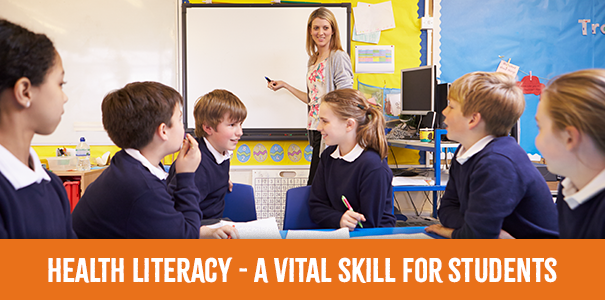Health Literacy – a vital skill for students
If the current pandemic environment has taught us anything, it is that the need for sound health literacy, and the ability to critically assess health information for credibility is vital for students (and their educators and parents).
Every Australian has had to cope with extra requirements just to conduct their daily lives safely.
For students—and in particular, senior school students—that pressure has been amplified by the uncertainty of exam timelines and disrupted face-to-face attendance at school in the final years, where they are studying and maturing towards transition into their future working life.
Standing alongside these students are the educators who encounter their own heightened demands to support and work for normalcy in teaching and revision, be that face-to-face, remote or both.
As such, health literacy knowledge has become paramount in many ways – through new skills, reported research and the ability to recognise credible information.
The Australian Curriculum rationale notes that: “Students need critical inquiry skills to research and analyse knowledge and to understand the influences on their own and others’ health, safety, wellbeing and physical activity participation. They also need to be resilient, to develop empathy and to be actively engaged in their own and others’ wellbeing, using health, safety and physical activity resources for the benefit of themselves and their communities.”
Whilst the modern student is connected on social media, potentially reducing some of their loneliness during periods of lockdown, the loss of physical activity and physical socialising may create other issues.
The Commissioner for Children and Young People (CCYP) have released a very helpful guide titled Health Hub – some ideas for creating more child and youth friendly health services. Information contained in this guide has been sourced from many conversations, discussions and consultations with children and young people of all ages and backgrounds living, studying and working throughout South Australia. You can download a copy of the report here.
According to the CCYP, “Children and young people have a clear idea of what being healthy means to them. The majority see major health concerns as relating to relationships with peers, partners and families, including such issues as self-harm, bullying, family and domestic violence, child abuse and neglect, and family stress.”
In seeking out answers for these health concerns, it is vital that young people understand what sources are credible. Given the plethora of information on the web and social media, this may not be as straight forward as it seems. Online users of any age can fall prey to false information and advice.
This reaffirms the need for schools, educators and parents to ensure students understand credible sources and know how to assess these sources themselves. This is currently taught from primary up to secondary levels, through the Australian Curriculum (Health and Physical Education: Sequence of content F-10) through topics such as: “Examine health messages and how they relate to health decisions and behaviours”; “Discuss and interpret health information and messages in the media and internet”; “Recognise how media and important people in the community influence personal attitudes, beliefs, decisions and behaviours”; and, “Critically analyse and apply health information from a range of sources to health decisions and situations”. You can read more here.
Insights from teachers and parents contribute to strategies to positively influence the health literacy of students and the wider community. It is vital that we all support students through these difficult and challenging times so that they follow the right health literacy pathway.
Sources:
https://www.australiancurriculum.edu.au/f-10-curriculum/health-and-physical-education/rationale/
https://www.australiancurriculum.edu.au/media/6633/health_and_physical_education_-_sequence_of_content.pdf
https://www.ccyp.com.au/wp-content/uploads/2021/06/Screen-Health-Hub-FINAL.pdf
https://issuu.com/ieunswact/docs/ie_magazine_2_2021_final – IE Magazine – page 18.
https://www.hcf.com.au/health-agenda/health-care/research-and-insights/fake-health-news-stories


